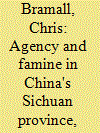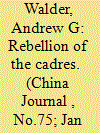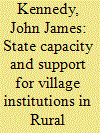| Srl | Item |
| 1 |
ID:
114581


|
|
|
|
|
| Publication |
2011.
|
| Summary/Abstract |
A revisionist literature on the Great Chinese Famine has emerged in recent years. These revisionists focus primarily on the question of agency. They claim that that neither poor weather nor the excesses of local cadres can explain the extent of mortality; rather, responsibility lies squarely with Mao and the CCP leadership. Using county-level data on mortality, output, rainfall and temperature for Sichuan province, I argue that this revisionist view is unconvincing. Weather admittedly played only a minor role, and the zealotry of the Party centre contributed significantly to the death toll. However, variations in mortality between Sichuan's counties appear to have been essentially random - suggesting that differences in local cadre responses to central government policy were decisive in determining the scale of famine.
|
|
|
|
|
|
|
|
|
|
|
|
|
|
|
|
| 2 |
ID:
145249


|
|
|
|
|
| Summary/Abstract |
Accounts of the tumultuous initial phase of the Cultural Revolution portray party-state cadres primarily as targets of a popular insurgency. Cadres in Party and government organs in fact were themselves in widespread rebellion against their superiors after October 1966, and rebel cadres were a major force in the national wave of power seizures that destroyed the civilian state in early 1967. The rebellion was a form of bureaucratic politics in a setting characterized by rapidly shifting signals and high uncertainty, in which the rebels’ motives were generated after the onset of the Cultural Revolution. Cadres played a central role in the destruction of the political institutions to which their vested interests were inextricably linked.
|
|
|
|
|
|
|
|
|
|
|
|
|
|
|
|
| 3 |
ID:
092872


|
|
|
|
|
| Publication |
2009.
|
| Summary/Abstract |
For successful political reforms, such as village elections or elimination of arbitrary fees, the central party-government must have the political capacity to implement new laws down to the village level. Thus for researchers as well as government officials, it is important to have accurate measures of reform success or failure. There are two equally important measures that are closely tied to state capacity. One measure is the top-down level of commitment that county and township officials have towards implementing reforms. That is, whether these new institutions exist and function at the village level. The second measure is the bottom-up villager evaluation of local institutional procedures and cadre behavior. Using data collected in one northwest province in 2000 and 2004, findings show that implementation of some reforms, such as village elections, is uneven, while other reforms, such as the 2002 tax-fee reforms, were more successful. There are two implications from this study. One is that the central party-government lacks the commitment rather than the capacity to fully implement village elections. The urgency of relieving villagers' tax-fee burdens that were perceived as the source of rural unrest and instability was more important than the development of village elections. Second, in villages where the reforms are fully implemented, villagers make a clear conceptual distinction between popular support for the elected leaders and the election process. That is, they display disgust for the elected leaders and support for the election process and the village fee system. However, in villages where reforms are not fully carried out, villagers exhibit a more uniform lack of support for leaders and local institutions.
|
|
|
|
|
|
|
|
|
|
|
|
|
|
|
|